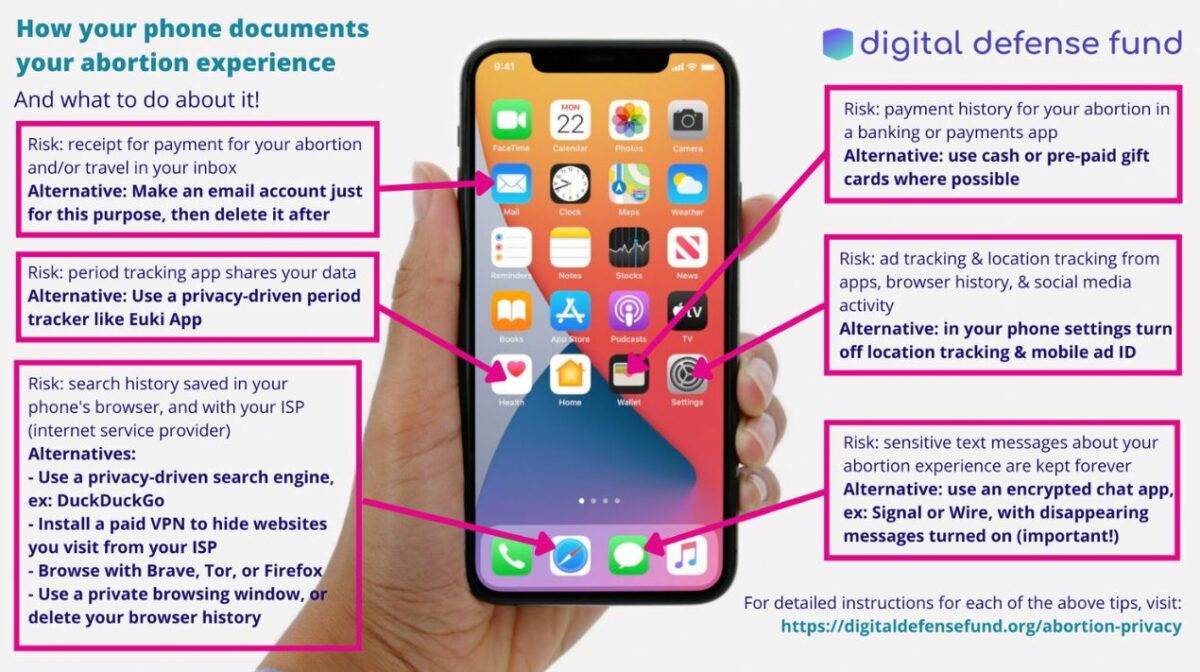
Since the U.S. Supreme Court decision in Dobbs v. Jackson Women’s Health Organization overturned Roe v. Wade, many are sounding the alarm on how times have changed in the last few decades. Namely, the internet now exists, thus does our digital footprint and the issue of digital privacy (a.k.a. the lack thereof). People are urging others to not only delete their period tracking and fertility apps, but go through the steps of ensuring the data from the apps is wiped.
These are apps like Clue, Flor, Natural Cycles, and more. Even for those seeking to conceive or who object to getting an abortion themselves, the data from a period/fertility app can be used against them, possibly in the case of a miscarriage. Critics of this movement to delete and clear data say that this doesn’t go far enough. The Electronic Frontier Foundation and others warn against ignoring other issues can leave you vulnerable via your browsing history, calender app, non-encrypted messaging (including email), and more. This graphic from the Digital Defense Fund shows how abortion activity can accidentally be tracked and used against you.

Since the initial SCOTUS opinion leak a few months back, some apps have tried to get ahead of this more than justified panic by assuring that they will not work with the police or state agencies. This includes companies that are not even based in the United States. There’s still a problem with these apps, though, because the paid ones can be traced to customers, and the free versions sell data. Insider reported Flo’s FTC issues with this back in 2021. One approach is working on an “anonymous mode.”
Let’s take all of their word for a second because they do important work for reproductive health. This does not work for U.S.-based companies when law enforcement and purity police (including abortion bounty hunters) can wrangle subpoenaed evidence. While currently, that may be some relief to a privileged few in the chaos, a national ban on abortion would make this harder to uphold. More information will be extracted regardless of company commitment.
The 9/11 Patriot Act widened the scope of what law enforcement (especially at the national and state level) could do in regards to privacy. They don’t even need your device’s data. Pinning data other companies collect about people to an individual person isn’t very hard, as this episode of John Oliver’s Last Week Tonight from earlier this year points out.
(via Twitter, image: Getty/Hanna Siamashka)
Here are some other bits of news we saw today:
- Boxer, activist, and actress Kali Reis joins Jodie Foster for True Detective season four. (via Variety)
- Early reporting finds that Meta companies Facebook and Instagram begin taking down posts offering abortion pills. Guns and more are okay though, don’t worry… (via AP)
- Early reviews of the Reading Rainbow documentary Butterfly in the Sky are looking good. (via The Film Stage)
- Home care attendant leads protest after a settlement resulted in her only getting $200 in back pay for the over 6,000 hours of unpaid overtime labor. (via NBC)
- Eat. Bang! Kill. Tour writer Tee Franklin hosts Twitter Space reaction to Harley Quinn: The Animated Series season three trailer. Soon joined by writers and Patrick Schumacker. (via Twitter)
- Authors speak out against being forced to pay Amazon after readers return ebooks. (via NPR)
What did you find on the internet today, Mary Suevians?
—The Mary Sue has a strict comment policy that forbids, but is not limited to, personal insults toward anyone, hate speech, and trolling.—
Have a tip we should know? [email protected]
